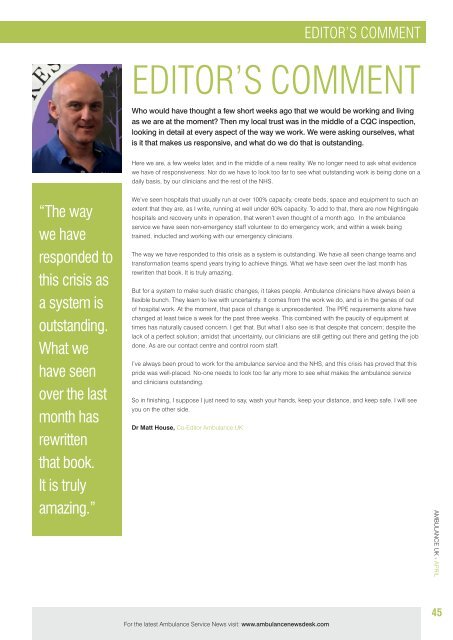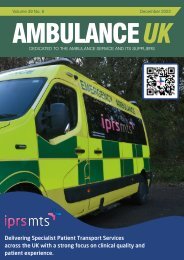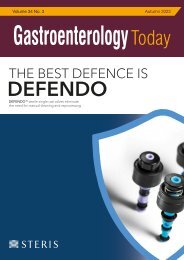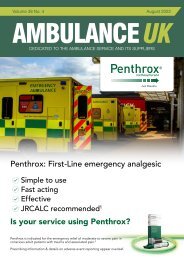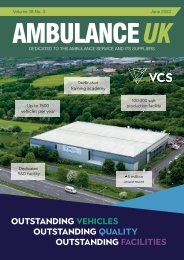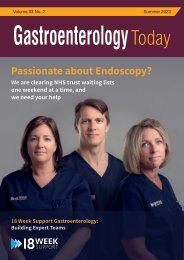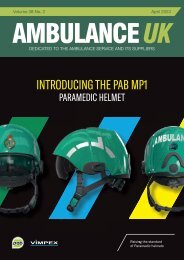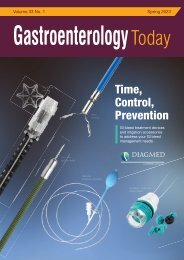Ambulance UK - April 2020
You also want an ePaper? Increase the reach of your titles
YUMPU automatically turns print PDFs into web optimized ePapers that Google loves.
EDITOR’S COMMENT<br />
EDITOR’S COMMENT<br />
Who would have thought a few short weeks ago that we would be working and living<br />
as we are at the moment? Then my local trust was in the middle of a CQC inspection,<br />
looking in detail at every aspect of the way we work. We were asking ourselves, what<br />
is it that makes us responsive, and what do we do that is outstanding.<br />
Here we are, a few weeks later, and in the middle of a new reality. We no longer need to ask what evidence<br />
we have of responsiveness. Nor do we have to look too far to see what outstanding work is being done on a<br />
daily basis, by our clinicians and the rest of the NHS.<br />
“The way<br />
we have<br />
responded to<br />
this crisis as<br />
a system is<br />
outstanding.<br />
What we<br />
have seen<br />
over the last<br />
month has<br />
rewritten<br />
that book.<br />
It is truly<br />
amazing.”<br />
We’ve seen hospitals that usually run at over 100% capacity, create beds, space and equipment to such an<br />
extent that they are, as I write, running at well under 60% capacity. To add to that, there are now Nightingale<br />
hospitals and recovery units in operation, that weren’t even thought of a month ago. In the ambulance<br />
service we have seen non-emergency staff volunteer to do emergency work, and within a week being<br />
trained, inducted and working with our emergency clinicians.<br />
The way we have responded to this crisis as a system is outstanding. We have all seen change teams and<br />
transformation teams spend years trying to achieve things. What we have seen over the last month has<br />
rewritten that book. It is truly amazing.<br />
But for a system to make such drastic changes, it takes people. <strong>Ambulance</strong> clinicians have always been a<br />
flexible bunch. They learn to live with uncertainty. It comes from the work we do, and is in the genes of out<br />
of hospital work. At the moment, that pace of change is unprecedented. The PPE requirements alone have<br />
changed at least twice a week for the past three weeks. This combined with the paucity of equipment at<br />
times has naturally caused concern. I get that. But what I also see is that despite that concern; despite the<br />
lack of a perfect solution; amidst that uncertainty, our clinicians are still getting out there and getting the job<br />
done. As are our contact centre and control room staff.<br />
I’ve always been proud to work for the ambulance service and the NHS, and this crisis has proved that this<br />
pride was well-placed. No-one needs to look too far any more to see what makes the ambulance service<br />
and clinicians outstanding.<br />
So in finishing, I suppose I just need to say, wash your hands, keep your distance, and keep safe. I will see<br />
you on the other side.<br />
Dr Matt House, Co-Editor <strong>Ambulance</strong> <strong>UK</strong><br />
AMBULANCE <strong>UK</strong> - APRIL<br />
For the latest <strong>Ambulance</strong> Service News visit: www.ambulancenewsdesk.com<br />
45


